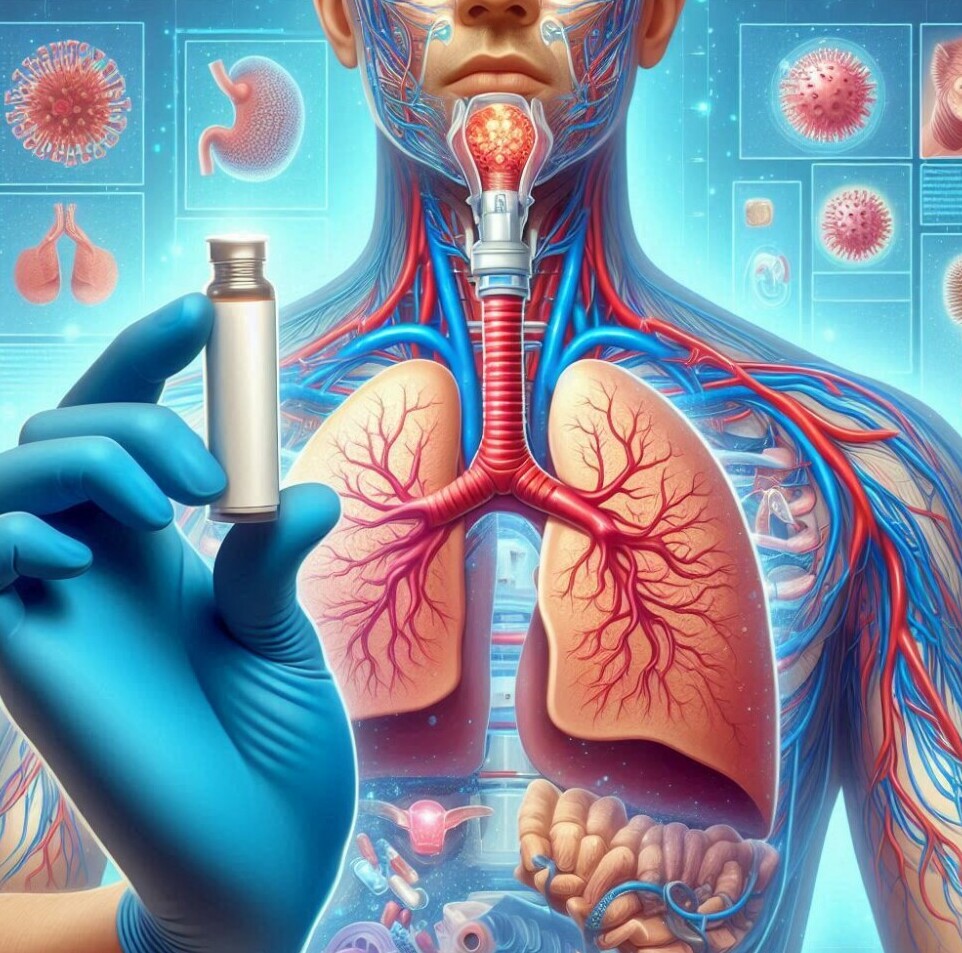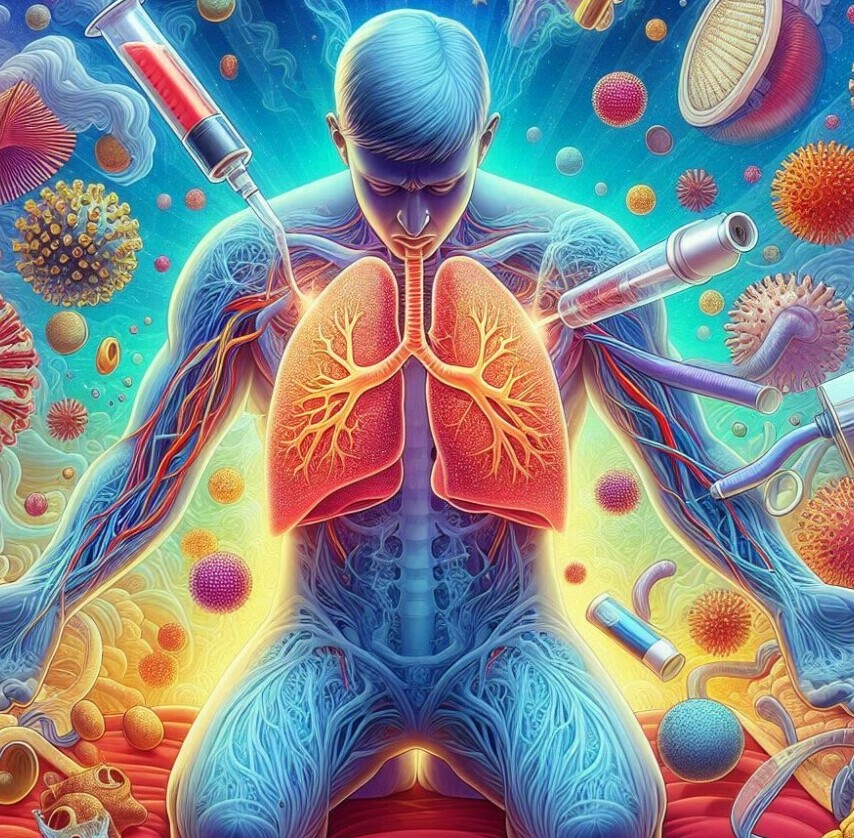
Asthma is a chronic respiratory condition characterized by inflammation and narrowing of the airways, leading to episodes of wheezing, breathlessness, chest tightness, and coughing. This disease affects millions of people worldwide, regardless of age or gender.
It is a common, long-term disease affecting the airways in the lungs. If you’ve ever felt like you couldn’t catch your breath after climbing a set of stairs, imagine that feeling being part of your daily life. That’s the reality for many people with asthma. It’s a condition that doesn’t discriminate, impacting both children and adults, and is characterized by symptoms like wheezing, shortness of breath, chest tightness, and coughing.
But not all asthma is the same. There’s a variety called allergic asthma, which flares up when you encounter certain allergens. In my experience, people often confuse the two, so I’ll make sure you’re going to find out about the differences, so you can understand why treatment and management strategies may vary.
At its core, asthma is about the airways, your breathing tubes. Think of them like the branches of a tree within your lungs. When asthma kicks in, these ‘branches’ become inflamed and narrow, making it tough to get air in and out. It’s a challenge that’s not just uncomfortable; it can be downright dangerous, especially during an asthma attack when immediate medical attention is often needed.
The struggle with asthma isn’t just physical; it also includes emotional and social challenges. Staying clear of everyday triggers—like pet dander, dust mites, or even cold air—can feel like a full-time job. And then, there’s the mystery of the symptoms – they can be unpredictable, varying in intensity from mild to severe, sometimes even within the same day.
So why do some people develop asthma? It’s a combination of genetics, environment, and lifestyle factors. Researchers are still working to understand all the intricacies, but one thing is clear: There’s a lot we can do to manage the condition and maintain a good quality of life, which is essential for anyone living with asthma.
Allergic Asthma: When Allergies Breathe Discomfort
You might wonder how allergies and asthma are related. Well, allergic asthma is a testament to the intimate relationship between our immune system and our respiratory health. It’s essentially asthma that’s triggered by the same substances that provoke allergy symptoms, hence the term ‘allergy-induced asthma.’
Common culprits include pollen, dust mites, mold, pet dander, and even certain kinds of food. These allergens, when inhaled by someone with sensitive airways, can lead to an asthma attack. That’s why understanding and managing these triggers is a pivotal aspect of controlling allergic asthma.
Diagnosis often involves a two-pronged approach: identifying the presence of asthma through pulmonary function tests and pinpointing specific allergies via skin or blood tests. Knowing exactly what triggers your asthma is like having a roadmap to better health. It enables you and your healthcare provider to develop a targeted plan to manage your symptoms.
Moreover, protecting yourself from these triggers is as important as any medication. Sometimes it’s the little changes that make a big difference, like opting for allergen-impermeable bedding or installing high-efficiency particulate air (HEPA) filters at home. I’m here to help you understand these strategies and find ways to integrate them into your life.
Delving Deep into Asthma’s Impact on the Lungs

To truly comprehend asthma, it’s essential to visualize the lungs not just as organs of breath but as the central battlefield where asthma takes hold. They’re complex, with a network of airways designed to facilitate the exchange of oxygen and carbon dioxide. Yet, when asthma strikes, these airways become inflamed and narrowed, leading to the characteristic shortness of breath, coughing, and wheezing so familiar to those affected.
Inflammatory responses are the core issue in asthma, resulting in chronic inflammation that irritates the lung’s airways. Over time, this can lead to a persistent state of hyperreactivity, where the airways overreact to even minor triggers. The lining of the airways swells, muscles around the airways tighten, and mucus production increases, all of which severely restrict airflow.
Because managing asthma involves easing these symptoms and preventing flare-ups, a cornerstone treatment approach includes the regular use of bronchodilators and anti-inflammatory medications. Bronchodilators work by relaxing the muscles that have tightened around the airways, while anti-inflammatories reduce the swelling and mucus production in the airways.
Keeping close tabs on lung function is vital. Pulmonologists often employ spirometry and peak flow meter tests to monitor how effectively an individual’s lungs are working. These tests measure the amount and speed of air that can be inhaled and exhaled, providing critical information to adjust treatment plans accordingly.
So, how do individuals with asthma ensure they manage their condition effectively? They embrace asthma-friendly products, gadgets, and apps designed to align with their lifestyle and treatment regimen. Let me steer you towards the next segment that talks about making your life easier with these asthma management aids.
Breathe Easier: Asthma-Friendly Products, Gadgets, and Apps

In a world teeming with technological advancements, there’s a silver lining for those managing asthma: the emergence of innovative tools designed to make living with this condition a bit easier. This isn’t just about comfort; it’s about leveraging the power of modern technology to stay in control of your respiratory health.
Asthma-friendly products span a wide spectrum, from hypoallergenic bedding to air purifiers with HEPA filters. These products are geared towards minimizing the presence of asthma triggers in your environment. Remember to look for certifications like the Asthma and Allergy Friendly Certification Program when shopping.
I’m going to highlight a few gadgets that have really changed the game. Portable nebulizers allow for on-the-go relief, while smart peak flow meters connect to your phone, providing digital tracking and reminders. Smart inhalers are gaining popularity as well, offering dose counters and usage tracking to ensure you’re adhering to your treatment plan.
Now what about the digital world? There’s a wealth of apps out there to assist individuals with asthma. Some provide daily allergy forecasts, while others function as asthma diaries to record symptoms and triggers. Certain apps even allow you to connect directly with healthcare providers, offering an extra layer of support.
All of these asthma-friendly products, gadgets, and apps are valuable allies in your health arsenal, but they complement, rather than replace, traditional treatment methods. Choose something that resonates with you; test out a few options and see what aligns with your lifestyle and needs.
Living with Asthma: Managing Symptoms and Enhancing Wellness
You’re probably wondering if you can completely get rid of asthma. The honest answer is that while there isn’t a cure for asthma, the symptoms can be managed effectively with the right strategies and medical interventions. This means that many people with asthma can lead full, active lives.
I’m going to highlight a few critical lifestyle changes and home remedies that have helped others manage their asthma. From maintaining a clean environment to engaging in regular exercise that’s tailored to your capacity, these adjustments can make a big difference. Also, avoiding smoking and secondhand smoke can significantly improve your respiratory health.
Of course, medical treatment remains a cornerstone of asthma management. Fast-acting relievers and long-term control medications play crucial roles in keeping symptoms at bay. It’s also important to keep regular appointments with your healthcare provider to monitor your asthma and adjust treatment as needed.
In my opinion, education is key. By understanding your triggers and learning proper inhaler technique, you’re equipping yourself with the tools you need for better asthma control. Additionally, consider embracing supportive communities, either locally or online, to share experiences and coping strategies.
Looking ahead, therapies for asthma are continually advancing, with new treatments aiming to target the underlying inflammation more effectively than ever before. This includes potential biologic medications for severe asthma and exciting developments in personalized medicine.
To sum up, while you may not be able to get rid of asthma entirely, it’s certainly possible to control it and reduce the impact it has on your life. Choose something that resonates with you, and remember that your healthcare team is there to support you every step of the way.
Ongoing research and advancements in medical science continue to improve our understanding of the disease, offering hope for even better treatments and potential cures in the future.
By staying informed and proactive, those affected by asthma can effectively control their symptoms and minimize the impact of the disease on their daily lives.
Kindly leave your comments and experiences below.
Simplified. Turn YOUR Passion, Hobby or Interest into YOUR Success Story! Join Wealthy Affiliate today: https://www.
**Here’s a little transparency: Our website contains affiliate links. We may receive a small commission if you click and make a purchase. Don’t worry, as there’s no extra cost to you. It’s a simple way to support our mission of bringing you quality content.
Follow me on social media!

Thank you for the excellent overview of asthma and its various aspects, from understanding the disease to managing symptoms with modern technology. The relationship between allergies and asthma, especially how certain allergens can trigger asthma attacks, is well-explained. I found the section on asthma-friendly products and apps particularly helpful. How has integrating these tools and technologies improved asthma management for others? I’d love to hear about personal experiences with different gadgets or apps that have made a significant difference.
Hello Laura,
I appreciate your kind words and contributions to the article.
Personal experiences often highlight how gadgets like smart inhalers and apps that track symptoms have made a major difference in the management of this disease.
In recent time, there has been a tremendous improvement in the symptoms discovery and management of Asthma, by providing real-time monitoring, individual action plans, and alert reminders for taking medications just by integrating some of these tools.
I look forward to more engagement, and people sharing more experiences on this disease.
Thank you for your thoughtful comment.
Best,
Makinde
Excellent overview of asthma and its various aspects, and understanding this disease to manage symptoms with modern technology. I found the section on asthma-friendly products and apps particularly helpful. The relationship between allergies and asthma, especially how certain allergens can trigger asthma attacks, is well-explained.Personal experiences with different gadgets or apps that have made a significant difference.
How have these tools and technologies improved asthma management for others ?
Hi Shawn,
I appreciate your insightful comment on the article.
Many people have reported significant improvements in managing their asthma symptoms through various tools and technologies. For example, smart inhalers can track usage and remind users to take their medications, while air purifiers with HEPA filters can reduce allergen exposure at home.
Apps that monitor air quality and provide pollen forecasts also help individuals avoid triggers.
These advancements allow for more tailored and proactive asthma management, ensuring better control of the health condition.
Thank you for your contributions and support.
All the best,
– Makinde